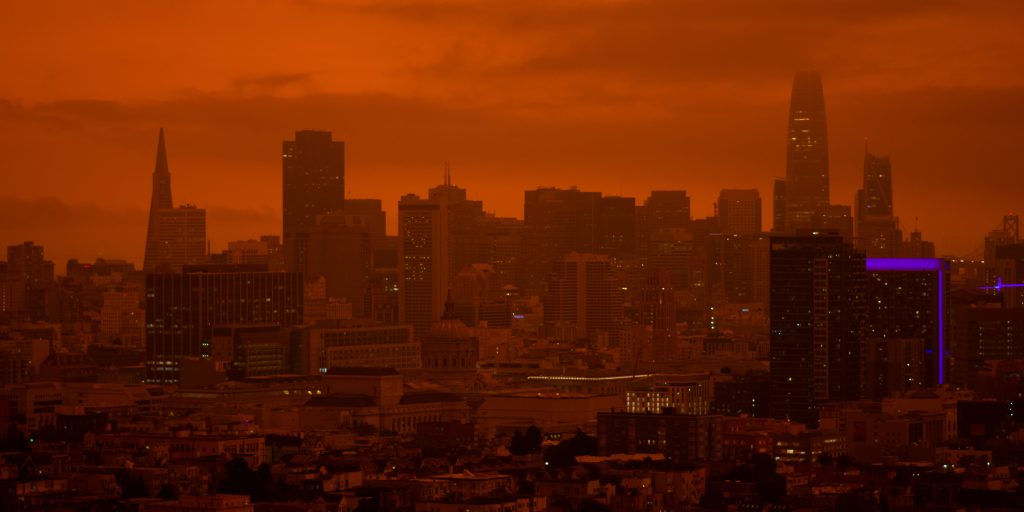Report: Regardless of party, mayors are united in concern about climate change — and what’s causing it
While opinions about climate change might split along party lines among the general public, mayors are universally clear about what’s driving it and are unanimous in their concern about its detrimental impact on American cities. In a new report published Wednesday by the Boston University Initiative on Cities, nearly all mayors surveyed in the 2022 Menino Survey of Mayors are worried about climate impacts on their cities—only 3% said they’re not concerned.
Nine in 10 “agree that climate change is real and caused by human activities, not by natural changes in the environment,” reads a statement about the report, “Mayors and the Climate Crisis.” “While there are some partisan differences among mayors, the most notable gap is actually between Republican mayors and Republican voters: 71% of Republican mayors surveyed agree that climate change is human-induced, relative to just 32% of Republican voters.”
For the mayoral report, researchers solicited responses last summer from 118 American mayors representing 38 cities on issues ranging from homelessness to the nation’s racial wealth gap. Previous Mayors often find themselves on the front lines by responding to natural disasters and implementing environmentally friendly policies.
“We’re seeing a lot of enthusiasm from a lot of mayors about local climate actions,” said David Glick, Menino Survey Co-Author and Associate Professor of Political Science at Boston University. “At the same time, we’re also seeing the realities that many mayors are constrained in various ways as only a subset of these enthusiastic mayors are embracing the full set of potentially controversial tools.”
Drought was the top local climate-related impact of concern (60% of mayors ranked it as a high priority), followed by extreme heat (58%), flooding (57%), pollution (56%), and fires (41%). Unsurprisingly, mayors in the West ranked drought and fires the highest, while those in the Midwest and Northeast ranked flooding, extreme heat and pollution the highest. Those in the Southeast listed flooding, drought, and extreme heat as their highest concerns.
“Our city continues to prepare for the impacts of climate change, from rising sea levels to increasing frequency and strength of hurricanes,” said Tampa Mayor Jane Castor. “While this crisis is a global one—calling for collaboration across all levels of government, the private sector, and citizens—mayors have been at the forefront of climate innovation, creating policies and tools that mitigate impacts, build resiliency, and address environmental justice concerns.”
When it comes to reducing energy consumption, mayors are pushing their communities to become more efficient, but they’re doing so for different reasons. Fifty-seven percent cited rising costs as the driving factor, and 47% said they’re doing so to lessen their community’s environmental impact.
More broadly, mayors perceive regulatory power as the best way to push for change. Influence over building codes (55%) and zoning (38%) were cited as the top two most powerful climate tools. They also strongly support new technologies like electric vehicles. Seventy-four percent want to replace their city’s municipal vehicles before their natural lifecycle concludes. On the other hand, mayors are reluctant to impose individual restrictions like prohibiting gas stoves, gas lawn tools, and gas and oil heat, or to try to dissuade residents from driving.
And when it comes to getting the word out, mayors are evenly split about the effectiveness of public meetings, and whether they’re informative or misleading. Likewise, there’s no consensus about the best way to hear concerns from marginalized communities.
“Climate related catastrophes have a disproportionate impact on low-income and marginalized communities,” said Gregory Johnson, managing director of the Equity & Economic Opportunity initiative at The Rockefeller Foundation. The research “should act as a stepping stone to building a plan to address the crisis with the needs of marginalized communities in mind.”
The Menino Survey of Mayors, which is named after the late Boston Mayor Thomas Menino, is supported by The Rockefeller Foundation. It’s an annual project undertaken since 2014 to understand the most pressing needs and policy priorities of America’s mayors from large and mid-size (over 75,000 residents) cities, according to the statement about the findings. More results from last year’s survey will be published in March.





















The reasons cited to combat environmental challenges pale in comparison to the negative impacts from ADOPTED ECONOMIC POLICIES, carried out in the name of “economic development”, heavily subsidizing the built environment. Why is there no focus on this matter?